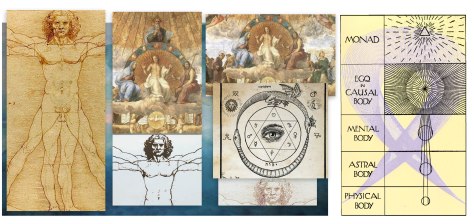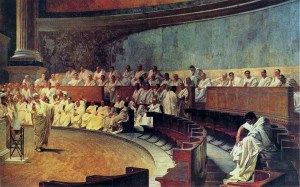Moving this review from an old blog of mine to here. I personally think ACIM is a regressive spirituality doing more harm than good. Any insight it has can be easily found in more sublime/less pompous sources.
Review of A Course in Miracles by “Jesus” (notes by Helen Schucman)
Here is folks, the Answer to Life, the Universe, and Everything™ delivered from New Age Jesus himself. It’s required reading for those who don’t want to be a mindless ego for eternity (but you should only accept it if you heart tells you to). It looks like a bible, and it’s quoted like one too. It’s A Course in Miracles, a channeled work which was “scribed” (channeled) over the course of several years in the sixties and seventies by Helen Schucman, a research psychologist. It is comprised of several hundred pages of a metaphysical screed, 365 exercises for chanting repeating to oneself (one for every day of the year), and a few odds and ends for good measure.
If you put stereotypical mysticism, condescension, and Christian theology together in the mind of a disturbed psychologist and boiled them for ten years, it might look something like this. A Course in Miracles (ACIM henceforth) claims that the physical universe is an illusory reality caused by the Son of God’s mad idea of separateness from the Cosmic Love Pit™…I mean oneness of God. This crazy idea created the ego, or the belief in a separate self that is maintained by our sense of guilt for having separated from God. However, we actually never separated, we just think we did, and the only way out of the separation that never happened is to love and forgive the world we find ourselves in. That we’re not in. Since this world is said to be a meaningless illusion created by our own thoughts, to forgive it is to forgive ourselves and therefore rejoin God, who is absolute oneness. That’s the best summary I can make of it. If you want more redundancy than that, try reading it yourself.
This book has become something of rallying point for new spirituality in the world. Many well known new age gurus (Eckhart Tolle, Marianne Williamson) have cited it as inspiration, or their “spiritual path.” It has also sold millions of copies worldwide in several languages. I won’t deny that there is some material of value in this tome, but I am extremely skeptical of the notion that this book is the complete enlightenment system its adherents claim it is. I will examine its thought system in terms of my understanding. I can’t do any less, and I can hardly do more.
ACIM stresses love and forgiveness above all else. It even says that the only emotions we can actually feel are love and fear. Love is of God and fear is of the ego. The love of God is emphasized as being ever present and all-encompassing, we are just blinded to its reality by the ego. True reality is considered unchangeable, perfect, loving oneness, and false reality is division, fear, and decay created entirely by our guilty thoughts. Psychologically speaking, I can see where this kind of belief structure would be a large improvement for an individual troubled by both the philosophical materialism and fundamentalist religion pervasive in our society. If something is not love, it doesn’t exist. Period. It’s a great way to wash your hands of the world, if that sort of thing appeals to you. However, what is at stake here is the meaning of spirituality itself. Does spirituality entail a ascetic denial of individuality and the material world? ACIM sure thinks so, saying “Dear God, I surrender my belief in individuality to You” (Lesson 224) and “If this were the real world, God would be cruel” (T-13.in.3:1).
The static reality of oneness and love is contrasted from the false reality of division and fear over and over. ACIM characterizes itself as a “purely nondualistic thought system,” where the goal is complete undifferentiated oneness. The truly “non-dual” spiritualities of the world actually regard this idea as a pratfall because even though ultimate reality is not really a multiplicity, it is not really a unity either. Instead, it is something bigger than each with attributes of both. In the final analysis, nirvana and samsara are said to be one. ACIM has zero respect for the mystical intuition that existence is big enough to contain contradictions seamlessly. For a book the eschews division, it harps constantly about the division between ego reality (which doesn’t actually exist) and God reality.
It doesn’t take a genius to figure out that the experience of a changeable world can never come out of a truly changeless reality. ACIM answers this perfectly valid criticism by saying that to ask such a question is to assume the changeable world exists (which it doesn’t), so it’s not worth asking. The demand on the part of this book to suspend reasoning when reason finds a flaw in its thought system should set off some red flags (a book that claims to be written by Jesus should set off a few more, by the way). This religious two step is typical of schools of thought that posit the existence of the devil, even if it’s not called that. ACIM’s devil is the ego, which is only a slightly more enlightened version than the one traditional Christianity believes in. Any criticism of its tenets can be deflected on to the big bad ego. It’s the same principle as “if you criticize the bible, you are corrupted by the devil.”
Certainly love is psychologically and spiritually healthy. Traditions the world over admit this. The Sufi poet Hafez couldn’t stop admitting it. The idea the love leads to spiritual bliss and enlightenment is not at all unique to ACIM. If attaining God is as simple as blissful love (as ACIM suggests) then why the textbook and the “required course?” If it’s all as simple as love=nirvana, ACIM could have be one sentence long. “Love is the answer to every question.” Boom. Done.
The reason, I think, is that the people who follow ACIM want something else besides love. They want an authoritative voice (Jesus) to give them answers and tell them what to do and think. There is a need that ACIM fills, a need for a complete and total thought system to live life by. Many adherents have claimed that ACIM is such a thing for them. It has 365 exercises that an adherent is supposed to complete one at a time each day. I can’t imagine a more structured thought system. Read the book, repeat the exercises to yourself, and forgive. It’s the autobahn to enlightenment. No pesky self reliance required.
The grand irony of all schools of thought that disparage individuality or the ego, is that the individual self must be the agent that elects to dissolve itself. The desire to transcend the ego can only be an attribute of the ego. If no capacity for decision making exists on the part of the individual self, then a spiritual practice of any kind is pointless (pretty zen though). All spiritualities, especially ones that deny the self, must appeal to the self (you! you there! stop thinking you’re a self and you will reach enlightenment). ACIM asks its followers to give up attachment to “specialness,” but from what I have seen of them, they tend to view themselves as the elect in a classic Protestant fashion. They’ll get to heaven faster because they have an enlightened textbook that does the heavy lifting for them. I’ve heard an adherent I know personally claim that this “path” is “faster.”
For a book that claims that this flawed world was created when the Son of God “Remembered not to laugh” [T-27.VIII.6:2-3], it bills itself as Serious Business throughout. There is nary a joke in several hundred pages of bible-leaf paper. It also lacks a sense of exaltation, of awe. The tone bounces back and forth between run-of-the-mill mystical statements and condescension towards the reader and the physical world. Maybe the Son of God forgot to laugh because he picked up a copy of ACIM.
This book has many many inroads in the New Agey community. The president of the Institute of Noetic Science (IONS) has called it “perhaps the most important writing in the English language since the Bible” (that comparison should tell you something). As for me, I think its popularity is explained by the fact that there exist in the world millions of people torn between nominal Christianity (the book uses reinterpreted Christian phrases frequently to describe its philosophy), and the existential void of materialism. These are the type of people that want to believe in a loving God, but can’t reconcile that belief with all the suffering and death in the world (Williamson, one its primary teachers, has noted this in her personal history I believe). They also have some a draw towards Eastern/New Agey topics. Then ACIM comes along and puts it all together for them with prepackaged answers: God didn’t do make suffering, none of this is happening, love your way back to oneness. Suddenly, a loving God can be reconciled with suffering and evil; suffering and evil don’t exist! The catch is that our personalities and everything we have known ourselves by and through don’t exist either.
I am something of an amateur scholar in mystical topics. I am biased, but hopefully not more than anybody else. The idea that there is a crack in God you can fall though and experience a fundamentally meaningless reality is far more scandalous to me than the reality of suffering. For all ACIM’s whining about the world not existing, its stated goal is to get you out of the world. There may be suffering here, but I believe (as Carl Jung did) that is far more important for your spirituality to feel that your life here has inherent meaning. That feeling might be actually the most important thing there is, but the idea that it can exist when you think that the only point to your life is to escape it is completely absurd.
Aldous Huxley said that the fundamental mystical conviction is that everything is All Right, even when its not. It’s the conviction that inspired the line “Though he slay me, yet will I trust in him” from Job 13:15. It means that in spite of suffering and death there is some mystery that breathes meaning into our sometimes absurd and painful lives. This statement sounds ridiculous to a person beset by worldly problems, but in those times that William James called “melting moods,” we can see that it’s true. A moment of clarity comes upon us, and we see that all our life, even the bad stuff, is extremely meaningful and interesting. These “moods” go against all waking logic, but when the “higher” thought shines through, they are self evident.
For all ACIM’s pontificating about love, oneness, and true reality, it is really a child of the world it loathes. It is obsessed with fear, the ego, and the physical reality whose existence it rejects, talking about them almost as much as it talks about love (and that’s saying something). While disparaging logic, it uses it to argue that the world you experience is a horrible mistake. You will not find the serene mysticism which states that God is “beyond all attributes” in this work. Instead, you will get an authoritarian voice that preaches against division while employing it at every moment, repeating itself with the frequency of a jackhammer.
When I criticize ACIM, the responses I often get are either that “I feel that it’s ture” or “it’s open to interpretation.” I won’t deny that this book helps some people for the reasons listed above, but I don’t think that inspiration proves the complete truth of a book. People are inspired by all sorts of texts (The bible for example). When positive feelings are evoked by a certain statement or idea, what it speaks to instead is the value of inner feelings. If you can feel truth, then toss al your books and follow your intuition. Your intuition was always the valuable part anyway. If ACIM can be interpreted in such a way to counter my criticisms, then I would also ask why people bother with it. If a book can be interpreted in so many different ways by different people, then again the truth ultimately lies with the individual and not the text.
I criticize this book primarily because I think that the most important thing in any individual’s life is the conviction that somehow, someway in spite of Everything that they matter, that what they do matters. Not just in a relative sense, but in a cosmic one. Any philosophy that diminishes or contradicts that feeling is anathema, and ACIM is clearly one of them. The supreme mystical sense that vetoes all others and passes all “art and argument of the earth” (as Whitman would say) is that of the cosmic tenderness. It’s the feeling that you can trust the universe no matter what. And you can’t trust the universe while distrusting yourself or your experience at the same time. It’s a zero sum game.
I could be a mindless ego afraid of falling into the Cosmic Love Pit, but if love means giving up everything I have ever known myself by, then it’s pretty worthless in my book. If an ascetic denial of the sensual world is spiritual, then I don’t want to spiritual. I’ll take my chances with this crazy world of ours and place all my money on my conviction that there is more going on here then atoms bouncing around, a divine test splinting the sheep and goats, or being run over by the wheel of samsara. I’ll close out with a couple quotes
“Where would God’s wholeness be if he could not be wholly other?” -Carl Jung
What is called good is perfect, and what is called bad is just as perfect” -Walt Whitman
Campbell: And the attitude is not to withdraw from the world when you realize how horrible it is, but to realize that this horror is simply the foreground of wonder and to come back and participate in it. “All life is sorrowful” is the first Buddhist saying, and it is. It wouldn’t be life if there were not temporarily involved which is sorrow. Loss, loss, loss.
Moyers: That’s a pessimistic note.
Campbell: Well, you have to say yes to it, you have to say it’s great this way. It’s the way God intended it.” -From The Power of Myth
Rating: 1.5 loons of 4. If you want to live in non-dual North Korea, this one’s for you.







